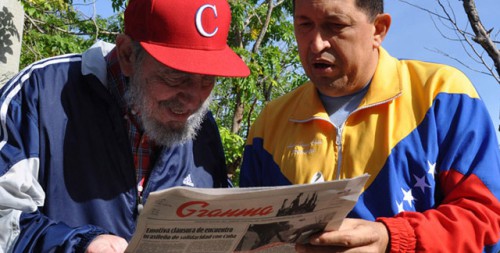Diego Zambrano Journal Contributor
On the early hours of Monday, Feb. 18 a tweet from the Venezuelan President’s Twitter account shook the Venezuelan people. Hugo Chavez let it known that he was back in Venezuela since he left on Dec. 10, 2012 to be intervened in Cuba because of a recurrent cancer. Nevertheless, Venezuelans have not seen Chavez since Dec. 8, 2012, when he told the country he needed to leave in a mandatory television broadcast.
So far, all Venezuelans know about their president since last December is what the government officials had said. Chavez has not appeared in public; he has not even called to the numerous parades, shows, TV events, and “cadenas” (mandatory TV broadcasts) that his government or his political party has made. The Government expects Venezuelans to take the word of Vice-President Maduro and the Minister of Communications Villegas as a proof that Chavez is back in the country and he is governing.
But the problem is that the continuous official “report” from the government speakers have presented numerous contradictions. The most sounded one came from Vice-President Madura when he notified the country that Chavez’s health was delicate after telling on TV that the President was doing exercises less than 72-hours before.
Chavez’s situation has created protests in Venezuela. Civil society has expressed through social media, where many Twitter accounts have constantly spread rumors and information about Chavez’s health. Also, a group of students decided to chain themselves in front of the Cuban Embassy in Caracas to call for Chavez to come back.
The first reaction from the overnment to calm down the focus of protests was to release some pictures of the re-elected President, but the pictures also present problems. Many opinions have appeared through social media showing how Chavez’s pictures were photoshopped. However, the greatest incongruence with the pictures is that they do not show Chavez’s tracheotomy, a medical process that the official reports confirmed.
Disregarding the continuous contradictions that the official reports or the incongruences with the pictures, the fact is that not seeing or hearing Chavez once is not trustworthy. The fact is that in the last 14 years of Chavez’s presidency, he has never escaped the public eye for a minute. We are talking about a person that had a Sunday show broadcast on VTV, the state channel.
Moreover, he continuously forced public and private TV to broadcast him in “cadena” where he spent hours talking about his childhood, how he threw a baseball, or singing. Hence, it makes no sense that he has not appeared for over two months if he is in physical conditions to continue in power.
But his public disappearance is not the only odd fact in this story. According to official reports, Chavez arrived at 4:20 am to the country. There is no video of his arrival, not even a picture. It is difficult to believe that none of the 13 publically owned TV stations failed to cover his arrival. Venezolana de Television (VTV), the main public channel in the country, has never missed any of Chavez’s departures or arrivals. The question is then why no one broadcasted the “Supreme Leader’s” triumphant arrival back home. How is it possible that a President enters its own country at dark, with no one being able to show an image of it, as if he was a drug package?
The reality is that what one can only corroborate is that the government says Chavez is back and good to hold office. There is no feasible proof to confirm the President’s true condition. In fact, all the evidence proves that Chavez is getting worse everyday. Not a single event in the chronology of his intervention in Cuba matches the profile of the charismatic, arrogant, messianic, and powerful Chavez.
In his proper conditions, I can assure Chavez would have called on Dec. 16, 2012 when his party won 20 of the 23 State Governor’s elections. If Chavez was healthy, he would have at least called when in Feb. 4, 2013 there was a parade commemorating his failed coup d’état more than 20 years ago.
The days are passing and what we only have is a shady rhetoric behind Chavez’s arrival, a lack of a medical report on his true condition, and not a single picture nor video about him. The government says that he cannot talk and his breathing problem is difficult at the moment, but Maduro held a five-hour meeting last Friday in which he assures Chavez took many economic decisions communicating through writing and “other means.”
Therefore, it does not seem that Chavez is in Venezuela. But if he is, then the problem is that the facts suggest he is not in condition to rule, because it is unfeasible that a public servant with the amount of work Chavez has (even though I doubt he completes half of it) can handle six years in office with his health condition, which has left him already mute.













The Suffolk Journal • Mar 1, 2013 at 12:30 pm
[International] Suffolk Venezuelan student on President Chavez’s return home: http://t.co/3vmM23BFLj